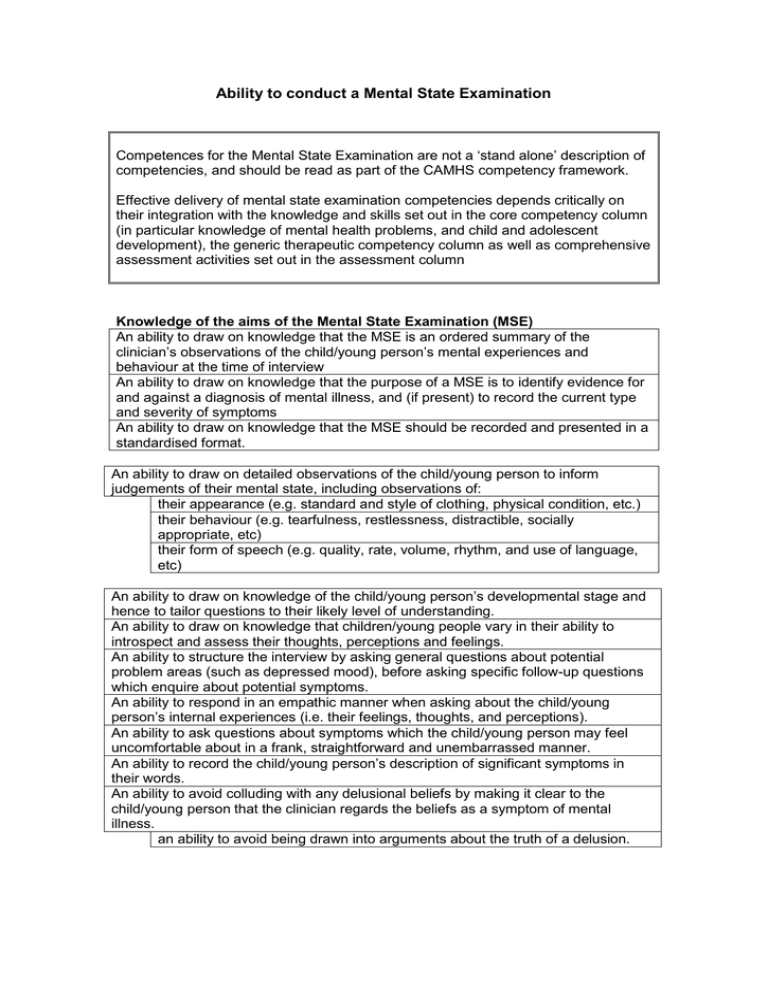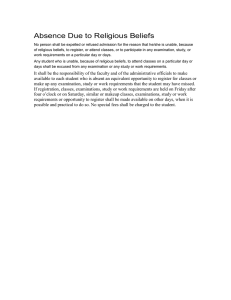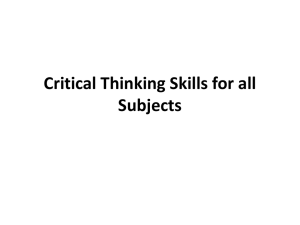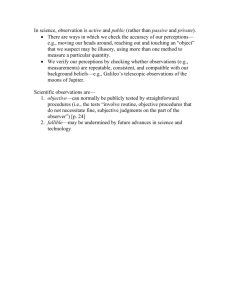Ability to conduct a Mental State Examination
advertisement

Ability to conduct a Mental State Examination Competences for the Mental State Examination are not a ‘stand alone’ description of competencies, and should be read as part of the CAMHS competency framework. Effective delivery of mental state examination competencies depends critically on their integration with the knowledge and skills set out in the core competency column (in particular knowledge of mental health problems, and child and adolescent development), the generic therapeutic competency column as well as comprehensive assessment activities set out in the assessment column Knowledge of the aims of the Mental State Examination (MSE) An ability to draw on knowledge that the MSE is an ordered summary of the clinician’s observations of the child/young person’s mental experiences and behaviour at the time of interview An ability to draw on knowledge that the purpose of a MSE is to identify evidence for and against a diagnosis of mental illness, and (if present) to record the current type and severity of symptoms An ability to draw on knowledge that the MSE should be recorded and presented in a standardised format. An ability to draw on detailed observations of the child/young person to inform judgements of their mental state, including observations of: their appearance (e.g. standard and style of clothing, physical condition, etc.) their behaviour (e.g. tearfulness, restlessness, distractible, socially appropriate, etc) their form of speech (e.g. quality, rate, volume, rhythm, and use of language, etc) An ability to draw on knowledge of the child/young person’s developmental stage and hence to tailor questions to their likely level of understanding. An ability to draw on knowledge that children/young people vary in their ability to introspect and assess their thoughts, perceptions and feelings. An ability to structure the interview by asking general questions about potential problem areas (such as depressed mood), before asking specific follow-up questions which enquire about potential symptoms. An ability to respond in an empathic manner when asking about the child/young person’s internal experiences (i.e. their feelings, thoughts, and perceptions). An ability to ask questions about symptoms which the child/young person may feel uncomfortable about in a frank, straightforward and unembarrassed manner. An ability to record the child/young person’s description of significant symptoms in their words. An ability to avoid colluding with any delusional beliefs by making it clear to the child/young person that the clinician regards the beliefs as a symptom of mental illness. an ability to avoid being drawn into arguments about the truth of a delusion. Ability to enquire into specific symptom areas An ability to ask about the symptoms characteristic of both uni-polar and bi-polar depression. an ability to notice and enquire about any discrepancy between the child/young person’s report of mood and objective signs of mood disturbance. An ability to ask about thoughts of self-harm. an ability to assess suicidal ideation. an ability to assess suicidal intent. an ability to ask about self-injurious behaviour. An ability to ask about symptoms characteristic of the different anxiety disorders. an ability to ask about the nature, severity and precipitants of any symptoms as well as their impact on the child/young person’s functioning. An ability to ask about abnormal perceptions. an ability to clarify whether any abnormal perceptions are altered perceptions or false perceptions. an ability to explore evidence for the different forms of hallucination. An ability to elicit abnormal beliefs. An ability to interpret the nature of abnormal beliefs in the context of the child/young person’s developmental stage, family, social and cultural context. an ability to distinguish between primary delusions, secondary delusions, overvalued ideas and culturally sanctioned beliefs. An ability to assess cognitive functioning. an ability to assess level of consciousness an ability to assess the child/young person’s orientation to time, place and person. an ability to carry out basic memory tests. an ability to estimate the child/young person’s intellectual level, based on their level of vocabulary and comprehension in the interview, and their educational achievements. an ability to conduct or refer for formal cognitive assessment if there are indications of a learning disability. An ability to assess the child/young person’s insight into their difficulties. an ability to assess attitude towards any illness an ability to assess attitude towards treatment Sources: Semple, D. and Smyth, R.(2009) Ovid Online: Oxford Handbook of Psychiatry (Second edition) at www.ovid.com


